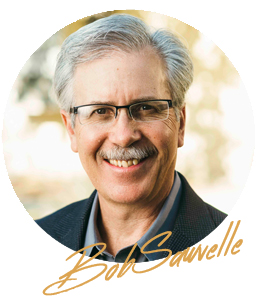
A few years ago, my wife and I were hiking in northern Montana, near Glacier National Park. The landscape and mountain views are breathtaking. We were enjoying the scenery, the warm summer day, and conversing about a variety of topics. We began to laugh as we recalled a “bear encounter” on a previous trip to Wyoming with our daughter. Fortunately, the three of us avoided a mother black bear and her cub while hiking that trip —it was too close for comfort!
We had a good laugh recalling our Wyoming vacation and bear sighting, aware that we were in Montana bear country and needed to stay alert. The day before, in the same area fishing, I saw a brown bear running down the side of the mountain—away from the trail thankfully! So, we were on guard “looking for bears.”
A few minutes later, we saw a dark image in the distance on the trail, moving slowly, back and forth, toward us. Carolyn grabbed my arm and said, “I think it’s a bear!” I wasn’t sure. I gazed across the sloping trail horizon and wasn’t sure what I was looking at. Carolyn was convinced it was a bear and we needed to do something quickly! But I said to her, “If it was a bear, why would it be moving methodically toward us on the trail?”
We stood frozen on the trail for a couple of minutes, not sure what to do. Suddenly, over the top of a little hill on the trail, our “bear” appeared! It was a man with a large backpack on his shoulders! Our preconceived concerns about bears in the area convinced us that we were looking at a bear, when it was only a hiker!
Is it possible that our vision has “blurred perspectives?”
I believe the answer is “Yes!” We may “see,” but not really “see.” Perhaps we have a distorted image of God, other people, or our circumstances. Maybe past hurts, traumas, or fears cloud our ability to see objectively and clearly. We can form judgments, preconceived ideas, that also distort our vision.
This week, I want to look at the story of the progressive healing of the blind man in Mark 8:22-26, segueing into a discussion about how we see others.
Then He came to Bethsaida; and they brought a blind man to Him, and begged Him to touch him. So He took the blind man by the hand and led him out of the town. And when He had spit on his eyes and put His hands on him, He asked him if he saw anything.
And he looked up and said, “I see men like trees, walking.”
Then He put His hands on his eyes again and made him look up. And he was restored and saw everyone clearly. Then He sent him away to his house, saying, “Neither go into the town, nor tell anyone in the town.”
Mark connects this story to the previous stories of those who are spiritually blind—unable to see clearly what God is revealing. It is a parallel story to the miraculous healing of the deaf-mute man in Mark 7:31-37.
Both stories (Mk 7:31-37 and Mk 8:22-26) serve as real-life parables, teaching that only Jesus can overcome our spiritual blindness. Peter after the blind man in Mark 8 receiving his sight, gives a radical confession of faith, “You are the Christ!” (Mark 8:27-30). Peter and the other disciples are “progressively” overcoming their spiritual blindness and hardness of heart.
The blind man is brought to Jesus, and they beg Him to heal him.
Jesus takes the blind man by the hand and leads him out of town to minister to him. Jesus spat on his eyes—literally—then put his hands on him. (By the way, the ancient world believed saliva contained healing properties.) Jesus asks the man if he saw anything. The man says, “I see men like trees walking!”
Jesus places his hands a second time on the man and he is miraculously healed, seeing clearly once again! Jesus demonstrates the love and compassion of God in healing this man, and it is a progressive healing. The progressive nature of this healing demonstrates a couple of things.
First, there are many times when praying for the healing of others, that we pray more than once – sometimes healing in progressive. Jesus demonstrates this reality in this healing with the blind man. Secondly, the understanding of the disciples that Jesus is the Messiah is progressive and unfolding as well.
Blurred Perspective—I See Men Like Trees Walking!
Have you ever looked at something for the first time and saw something different? The man’s vision was blurred, and he saw a wrong image. Carolyn and I saw a hiker with a backpack, thinking it was a bear!
Often, our vision is blurred, and we see others differently than they are, perhaps due to our hurts, fears, wrong opinions, and even judgments. These and other factors can affect how we see others, ourselves, and our situations.
Here’s a question: Could it be we see others as trees walking? If we see others as trees, how do we treat them? AS TREES! The Real Question to ask is: How do we see people? Are we looking at them how God sees them?
In Genesis 3 we see that man has sinned, as a result mankind is separated from God and has acquired a sin nature. We are fallen and separated from God apart from Christ.
When we look at people then, do we only see them as sinners, or perhaps something else? Yes, man is also ALONE! Before Genesis 3, aloneness was an issue for humanity! God said it’s not good for us to be alone; we need others! (Gen. 2:18)
When the ALONENESS ISSUE is met in the lives of many, then the SIN ISSUE can be addressed, the need for Jesus!
Have you ever felt ALONE, not a friend you could turn to for help or comfort?
I’ve been there. Carolyn and I went through a season just after getting married where we decided we were going to follow Jesus wholeheartedly. Within weeks, we lost all our friends—we felt alone. However, God quickly brought us many new Christian friends as we walked with Him faithfully.
How did God know it wasn’t good to be alone? Through the CROSS!
On the cross, Jesus cried out to the Father, “My God, My God, why have you forsaken Me?” (Psalm 22:1, Matt. 27:46) In that moment, Jesus knew what it was like to feel separated from the Father as he carried the sin and sickness of humanity upon himself on the cross.
Jesus knows what it is to be alone, and He knows the aloneness, rejection, and abandonment that we often experience in life.
The writer of Hebrews states of Jesus, “For we do not have a High Priest who cannot sympathize with our weaknesses, but was in all points tempted as we are, yet without sin. Let us therefore come boldly to the throne of grace, that we may obtain mercy and find grace to help in time of need.” (Heb. 4:15-16 NKJV)
Jesus understands what it feels like to be alone, he understands temptation and weakness. The answer for you and me: Come to the throne of grace, believe that He can heal the pain and wounds of the past!
Keep in mind that grace is receiving something we don’t deserve, mercy is not getting what we do deserve. God says, “I will have mercy on her who had not obtained mercy.” (Hos 2:23)
Understand that our coming to Christ is as much to heal the “aloneness in our hearts” as to forgive us from sins. Jesus said, “I will be with you always …” (Matt. 28:20) We must see this truth in others as well!
I can do everything, just me and God, right?!
Didn’t Paul say to the Philippians, “I can do all things through Christ who strengthens me” (Phil. 4:13 NKJV)? Yes, but it is a wrong understanding of our interconnectedness to God and to others. We need God and each other!
If you believe it’s only you and God, then you see yourself as a TREE WALKING! We need each other—must love God and each other!
17th-century English poet John Donne wrote, “No man is an island, entire of itself; every man is a piece of the continent, a part of the main.” You are not an island unto yourself, you are part of the body of Christ, interconnected to others by God’s Spirit.
Sometimes we are alone because we choose to be. Past hurts can cause us to be unable to trust others. We must see that we need each other—stay connected!
Solomon wrote, “two are better than one…woe to him who is alone when he falls… and a 3-fold cord is not quickly broken.” (Eccl. 4:9-10,12 (NLT))
God created us to be in relationship to Him and with each other. Remember, Sin separates us from God and from each other. But, “God sets the solitary (lonely) in families…” (Psalm 68:6)
Sin relates to aloneness in that we can become:
a) Self-Reliant
b) Self-Centered
c) Self-Condemning
The Sin in Genesis 3 relates to the aloneness in Genesis 2! The root of these sins is pride. “I don’t need others or God, it’s about what I want!”
We often control others to avoid rejection or abandonment. Pain, unresolved, attempts to control to avoid further pain. Here are some examples of individuals who controlled others and their situation to avoid further rejection and pain:
Prodigal Son (Luke 15:11-27)
Older Brother (Luke 15:28-32)
Shrewd manager (Luke 16:1-8)
Rich Man and Lazarus (Luke 16:19-31)
Why do we need others?
To help us in our walk with God, to help when we fall, to minister to our aloneness needs, and to unite to build and advance God’s Kingdom. He who has friends must show himself friendly!
The only way to heal hurts is through mourning and comforting—it takes people to help this process through the power of Christ.
Paul said, “Share each other’s burdens, and in this way, obey the law of Christ.” (Gal. 6:2 NLT) We are to pray, minister to, and care for each other.
We are also instructed in James 5:16 to “confess your sins (faults, unintentional errors, offense) to one another, and pray for one another that you may be healed.” You may have a blind spot! Takes vulnerability with others through the power of the cross to remove the hurts, rejection, and aloneness that many carry.
Last Thoughts
God never intended for you and me to be alone in life or our Christian journey. God is re-connecting, bringing wholeness to his people as we endeavor to work together and allow healing to occur.
We must see this need in others and in ourselves. Part of the Great Commission is to heal the broken hearted.
This understanding is needed to build the Church, the community of believers, who are able to nurture and help each other and those who will be coming into God’s Kingdom.

For a more in-depth look at this topic, watch the Passion Church message, “I See Men Like Trees Walking!”:






